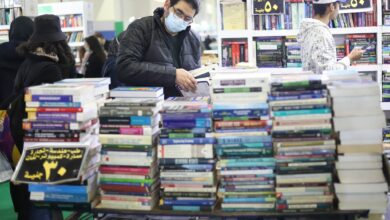Zeinab Abul-Magd did not take her move to Oberlin, Ohio in the rural American Midwest easily. Abul-Magd, a professor of Middle East history, spent her post-graduate years in the more dynamic and cosmopolitan hub of Washington, DC. Moving to a teaching job at Oberlin College, located in a town of about 8,000 residents surrounded by farm land was, at times, daunting.
“When I received a job in this small isolated city, my supervisor at my previous university in Washington, DC told me ‘if life gives you lemons, make lemonade,’” Abul-Magd writes at the end of her book Yawmiyat Abla fi Aryaf Amrika (Diary of a Professor in the American Countryside). Her book turns out to be more than just lemonade.
Through a series of notes, Abul-Magd writes a diary of her experience in Oberlin, making observations about the conservative society inhabiting the town, the activist milieu at the college, and the resonance of these things on her as a young Egyptian intellectual who is well-engaged with her local context.
Abul-Magd packages her book as an attempt to write about the Other, an academic and journalistic tradition with a long history. But usually, the Other is examined from the position of power—the North analyzing the South, or the West looking at the East—in a process that objectifies the subject. In Yawmiyat Abla, Abul-Magd attempts to reverse the typical processes.
“It’s always the colonizer who writes about the colonized,” she says using well-defined terms. “In rare cases, the colonized goes to the territories of the colonizer and writes personal diaries. Most of the time, those diaries take the shape of high praise like Rifa’a el-Tahtawy’s case or shock and a negative impression like Sayyid Qutb’s,” she says in a conversation from her current home in Oberlin.
“We are always intimidated and don’t think we are able to scholarly analyze our colonizer because we still have the inferiority feeling of the colonized. That’s why I decided to step over this fear and give a new model to researchers whereby they can reverse this traditional relationship.”
Abul-Magd uses the word “ethnographic” early on in the book, bringing to mind the fact that anthropology emerged from the European colonial experience, which shaped the relationship between the researcher and the subjects of research.
The diaries explore different aspects of life in Oberlin and nearby cities, from dynamic religious practices, to traditional communities surviving modernity, to political activism and anti-Republican attitudes on campus, to the transformation of the local economy in the wake of globalization, among others. There is always a reference to Egypt, which is essential in the context of understanding an imperialist project. In the diaries, American imperialism is generally perceived through the lens of observations from everyday life, which offers dimension of reality to the concept.
Abul-Magd skillfully relays her accounts with the wit of a gifted professor and historian. For example, she tells the story of the nearby city of Cleveland as a showcase of quick transformations in America’s history of social and political movements. The city was a capitalist hub during the industrial revolution of the mid-1800s, particularly as a center of the automotive and steel industries. But the city’s glamour dissipated as America moved from industrial capitalism to technological and financial capitalism. The ‘city of the cities’ is now a home to the poorest communities in the United States and some of the worst examples of urban decay.
Similarly, she recounts how Chicago became another capitalist hub in the mid-1880s and an exporter of capitalist thought to the world, despite historic labor strikes and other anti-capitalist actions including armed gangs.
While making these stories accessible to the average Egyptian reader, Abul-Magd weaves connections with the situation in home country. She asks questions about how we live in the shadows of the American imperial project and how our home-grown opposition movements respond to this project. In a piercing statement she says, “The strikes of the marginalized in Chicago have succeeded to bear fruits for more than a century and our strikes have failed. Why? …America speaks with a faithful heart about democracy in the morning and in the evening, funds our government to spend on its security apparatus that oppresses us. At the end of the day, it rolls up its sleeves, stands on the roads of our exhausted cities to sell fast food.”
Abul-Magd relays these stories in an intimate language, sometimes drawing on popular every-day speech and anecdotes. The style can be a source of contention, but the real challenge it encounters is relaying such complex accounts with ease. “This kind of writing is more difficult than academic writing," she says. "It takes longer because you try to relay complex ideas based on specialized readings in the field of economics, politics, and history, using a simple language that does not overburden young readers with theories.”
While her use of colloquial Arabic is a common choice in contemporary Egyptian texts, it does not conceal her ability to use classical language. When asked whether it was difficult to take on such an un-academic endeavor, she admits to doubts, but says she was positive about what she did at the end. “My biggest issue is to make my ideas accessible and to express them in the simplest possible way to the biggest portion of readers. Academic writing has a very limited readership, especially when it comes to such important and sensitive issues like the American empire. I needed to represent it in a real way.”




